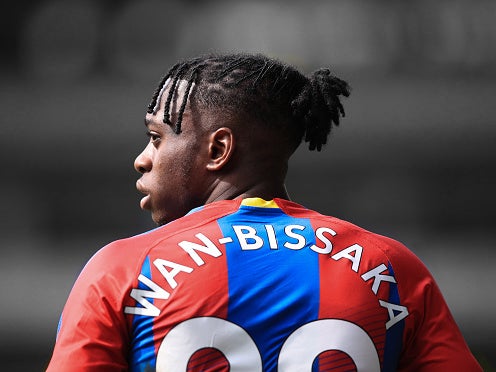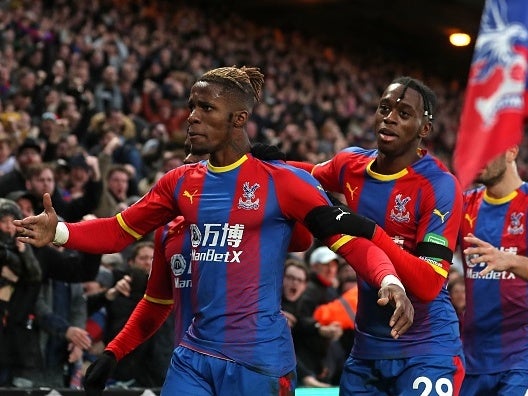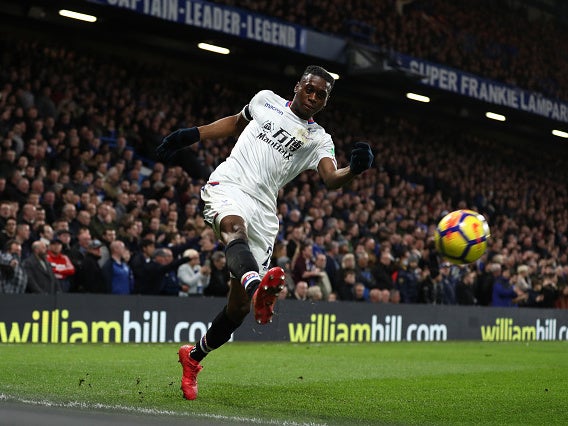Aaron Wan-Bissaka: The Manchester United new boy’s rise told by Crystal Palace coaches who made him
Exclusive: After almost being released by the Eagles as an ambitious striker aged 14, Wan-Bissaka has since emerged as one of the most exciting young defenders in English football

Your support helps us to tell the story
From reproductive rights to climate change to Big Tech, The Independent is on the ground when the story is developing. Whether it's investigating the financials of Elon Musk's pro-Trump PAC or producing our latest documentary, 'The A Word', which shines a light on the American women fighting for reproductive rights, we know how important it is to parse out the facts from the messaging.
At such a critical moment in US history, we need reporters on the ground. Your donation allows us to keep sending journalists to speak to both sides of the story.
The Independent is trusted by Americans across the entire political spectrum. And unlike many other quality news outlets, we choose not to lock Americans out of our reporting and analysis with paywalls. We believe quality journalism should be available to everyone, paid for by those who can afford it.
Your support makes all the difference.Aaron Wan-Bissaka doesn’t get nervous. Pressure doesn’t bother him.
The Crystal Palace right-back is set to become one of the most expensive English footballers ever. But he won’t be remotely daunted by the prospect; just as he wasn’t fazed by an introduction to senior football in late February 2018 that saw him debut against Tottenham Hotspur, before squaring off against United and Chelsea, all in the space of 13 days.
A spate of injuries which ruled out 12 first-team players, including regular right-back Joel Ward, presented Wan-Bissaka with the chance to become the first graduate from Palace’s previously prolific academy to make a full Premier League debut in more than five years. “I wasn’t nervous,” he told the club’s official website after taking on Spurs in the first of his three-game baptism of fire, “because I have been waiting for this for a long time.”
“He didn’t let anyone down,” enthused Gary Issott, Palace’s academy director and a key figure in the young defender’s development, speaking to The Independent. “He had to mark [Christian] Eriksen, [Alexis] Sanchez and [Eden] Hazard. He earned the trust of his manager.”
Palace lost all three games by a single goal, but Wan-Bissaka stood out regardless. He was named man of the match in the dramatic 3-2 defeat to United and claimed the first of his four club Player of the Month awards at the end of March, his maiden full month in the first team. He finished the campaign with seven senior outings under his belt, and established himself as Roy Hodgson’s primary option on the right side of defence early the next season, ending 2018/19 as Palace’s Player of the Year. What makes Wan-Bissaka’s rapid assimilation to Premier League life all the more remarkable is that at the time of his debut he had been a right-back for less than two years.
Born and raised in Croydon, despite the proximity to Palace, Wan-Bissaka hails from an Arsenal-supporting family, and Thierry Henry was his childhood hero. When he joined the Eagles’ academy from local grassroots side Junior Elite aged 11, he was a striker. He later developed into a winger and would attempt to emulate the flair and trickery of former Palace wide man Yannick Bolasie.
Joe Shields, the former head of academy recruitment at Palace, was alerted to the young Wan-Bissaka’s gifts by Colin Omogbehin, the chairman of Junior Elite who was coaching and scouting at Palace at the time, and who is now the under-18s head coach at Fulham. “He was a street footballer,” Shields, who is now Manchester City’s head of academy recruitment, explained to The Independent, “like Wilfried Zaha.”
It was by chance, then, that Wan-Bissaka came to play in defence. One Thursday morning during the 2015/16 season, he was among a group of under-23 players making up the numbers for an 11-v-11 drill in first-team training. Little did the then-18-year-old winger know, he was about to be tasked with shackling Wilfried Zaha, one of the most gifted and unpredictable attackers in the Premier League; a challenge Wan-Bissaka, typically, faced without apprehension.

Kevin Keen served as first-team coach at Palace under both Alan Pardew and Sam Allardyce, and it was he who first recognised Wan-Bissaka’s defensive potential. “I remember it really well,” Keen told The Independent. “The manager asked for some of the under-23s to come over, and they didn’t have a right-back. I said, ‘Just bring Aaron over and I’ll play him at right-back.’ So Aaron came over, played right-back against Wilfried Zaha, and I thought, ‘Hold on a minute, this boy knows what he’s doing as a right-back,’ because Wilf is very hard to defend against. I made a note of it mentally, and then the next day I did the same.
“The following day he played against Andros Townsend. Again, he did really, really well and showed a fantastic defensive mentality. That raw material was there to be seen: his strength, his power, his understanding about how to defend against two top-class international players. It was very natural. All of a sudden you think, ‘This boy could be a top Premier League defender.’ So I spoke to [under-23s manager] Richard Shaw. I said, ‘For the next few games, play Aaron at right-back and see how he goes.’”
During his playing days, Shaw played more than 200 games at the back for Palace and was the club’s Player of the Year in 1995, so there was no one better to oversee Wan-Bissaka’s transition. And exposing their youngsters to various on-field roles is par for the course within Palace’s academy: “We try and give them a mixture of positions younger down,” Issott says. “Then at 18, 19, it’s a finishing school: if you’re a right-back, here’s all the finer details of being a right-back; there’s so much to learn.”
It wasn’t all plain sailing for Wan-Bissaka, though. Despite excelling against Zaha and Townsend in training, competitive games proved more challenging; in his first under-23s start in his new position, he struggled against Charlton Athletic, and opponents would often try to exploit his still-developing understanding of defensive positioning. But he began to stay behind after training to work on his defending, augmenting his natural ability in one-v-one situations with a sharpened positional sense and refining his aerial game.

And it is to his immense credit that the defensive side of his game is now where he is considered most proficient. Last season he made more tackles (129) and interceptions (84) than any defender in the Premier League – nobody can shut down an entire flank as effectively as Wan-Bissaka.
“He’s got incredible athleticism, incredible focus on the ball one-v-one,” Issott says, detailing the key attributes that have seen Wan-Bissaka thrive as a right-back. “I think he genuinely doesn’t look at body movements or get moved by it. If you go through the 20 clubs in the league and their 20 right-backs, he’s right up there.”
But there remains room for improvement. In the modern game, there is increasing emphasis on full-backs to contribute in attack, whether speeding up the wing to provide crosses and cut-backs, or stepping into midfield and helping construct passing moves. Wan-Bissaka’s return of just three assists in 42 Premier League games to date pales in comparison to the 12 assists Trent Alexander-Arnold – with whom Wan-Bissaka will likely contest England’s starting right-back slot for the next decade – registered last season.
Of course, this is, to some extent, a reflection of the systematic restrictions Wan-Bissaka plays under at Palace, where he isn’t afforded anything like the same freedom to attack Alexander-Arnold benefits from at Liverpool. Even so, if the mooted big-money move to Old Trafford materialises for Wan-Bissaka this summer, this is an area he will have to prove himself in.

But working to improve and to demonstrate his worth is nothing new to the 21-year-old. At 14, there was debate among Palace’s academy staff over whether to release Wan-Bissaka, with Shields, who continued to champion the youngster’s cause along with Omogbehin and others, describing his transition into academy life as “a real struggle”; by 15 he was one of the club’s standout attacking talents. Less than four years ago, Wan-Bissaka was part of a DR Congo youth side that was hammered 8-0 in a friendly against England; this month he will represent England at the European Under-21 Championship, and a senior debut is considered overdue. Before an injury crisis thrust him into the Palace first team, he was being considered for a loan to the Championship; now he is one of the Premier League’s outstanding young players and the object of Manchester United’s desire.
Pure chance has played a big part in shaping Wan-Bissaka’s career to date, and his ultra-laidback demeanour – much like his defending – may give the impression that each twist and turn has been expected. But that’s because he’s worked tirelessly to maximise every opportunity that has come his way.
"What I like about him is the way he continues to work hard at his game, the professionalism he shows and the fact that he's been able to keep his feet so firmly on the ground when a lot of good things have been written and said about him,” Roy Hodgson said of Wan-Bissaka in a press conference ahead of Palace’s trip to Burnley in March last season. “When you have a good player at our level in the table, that player's always being linked with other clubs, but for Aaron it doesn't seem to have bothered him."
At 21, Wan-Bissaka’s greatest challenges are yet to come. He awaits them, calmly.
Join our commenting forum
Join thought-provoking conversations, follow other Independent readers and see their replies
Comments